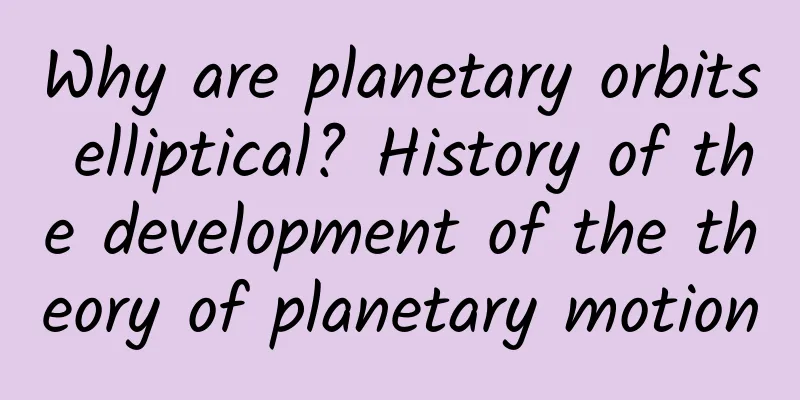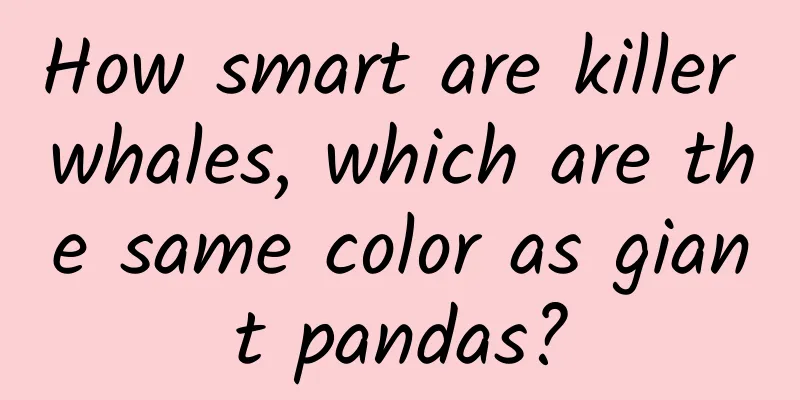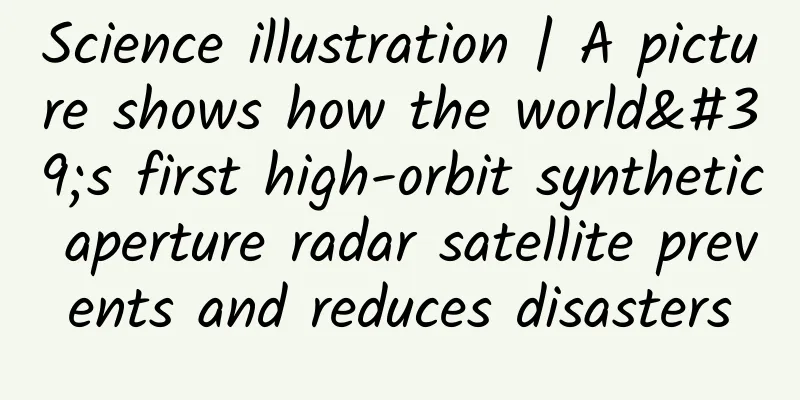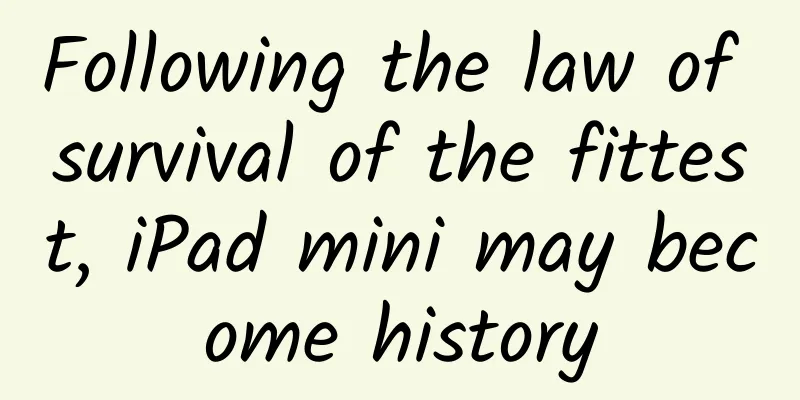Why are planetary orbits elliptical? History of the development of the theory of planetary motion

|
A few years ago, I casually asked an astronomer: "Why are the orbits of planets elliptical?" The astronomer answered without hesitation: "If you solve it using Newton's gravitational equation, you will get an ellipse." I was shocked at the time. No wonder Asimov wrote: "I think most historians of science would immediately say in unison that Newton is the greatest scientist the world has ever seen." It was Newton who truly solved the mystery of the movement of celestial bodies. Since his theory of gravitation, the movement of planets can be accurately calculated, and we can predict solar and lunar eclipses to the second, thus laying the foundation for modern astronomy. A few years later, I was suddenly shocked. This answer does not seem to be the answer - does Newton mean an ellipse if he says it is an ellipse? - Is he God? The orbit should be an ellipse, so Newton came to the conclusion that it is an ellipse... Then why is the orbit an ellipse? ... The earliest theory of planetary motion, the Ptolemaic system, was born in ancient Greece. "At that time" the sun revolved around the earth, and the orbit was a perfect circle. For more than a thousand years, people maintained this theoretical system until Copernicus proposed the heliocentric theory, but the orbit was still a circle. As the research deepened, Kepler proposed the elliptical orbit of the planet, which is Kepler's first law. Comparing Kepler with Newton, Newton further gave the reason for the elliptical orbit - universal gravitation (in fact, there is another embarrassing reason - God's first impulse in the tangential direction), thus bringing astronomy into the era of physics. Hawking wrote the popular science book "A Brief History of Time" in extremely concise language. The only anomaly is that he repeated the same topic at the beginning and end of the book: scientific theories are just mathematical models in the minds of scientists. Why did he emphasize this point? In his early years, when the French astronomer Laplace was asked by Napoleon why he did not mention God in his magnum opus "Celestial Mechanics", he firmly replied: "I do not need the assumption of God!" If he does not need the assumption of God, then what assumption is needed? In the common thinking habits of human beings, there must always be a cause for every effect, and the cause should be specific and real. But in science, this is not always the case. Why? Please allow me to leave astronomy for a while and recall chemistry. The founder of modern astronomy and physics is Newton, while the founder of modern chemistry is Lavoisier, who created the basic theory for modern chemistry - the oxidation theory. Before him, there was a popular theory called "phlogiston theory", that is, the so-called combustion is the consumption process of phlogiston in combustible substances. But as more and more experiments were carried out, people found that many objects did not become lighter but heavier after burning, and since then the phlogiston theory was obviously untenable. So the oxidation theory was born, and modern chemistry was born. What makes people think is that people cannot determine the occurrence of natural phenomena. If there has never been an object that becomes heavier after burning, then when will humans establish the concept of oxidation? Indeed, human cognition is always restricted by nature. But it is true that history cannot and does not need to be assumed, and from the confidence in human wisdom, I also believe that the oxidation theory is bound to come into being. (Further away from the topic, the reason for the "phlogiston theory" seems to be that people did not regard air as a substance at that time.) In this way, science can be said to be the bond between humans and nature. Metaphorically speaking, the bridegroom, the bride, and the matchmaker are real people, and scientific theory is the legendary red string that connects them. The most fundamental goal of science is to explain the relationship between various phenomena in nature; artificially created scientific theories, scientific definitions, and scientific concepts are not necessarily real, but more of a description. Just like magnetic lines of force are descriptive concepts of magnetic fields, their specific existence is not the point. It can also be said that believing in the correctness of the theory of gravity and firmly believing that there is something called gravity are two separate things. (This may not be a practical problem that must be solved, but it at least means a vision and mind.) The key is that better and more advanced scientific theories have improved the level of human cognition, such as accuracy. So the answer at the beginning of the text is actually qualified, as long as you are willing to give up the pursuit of a substantive answer. After all, even Newton himself had to bring up God. (It has to be admitted that the correctness of the theory is result-oriented. As long as the data is correct, it is good data, and as long as the theory is correct, it is a good theory.) Therefore, science is a way of solving problems to uncover the mysteries of nature. Any theoretical result cannot be strictly confirmed in reality. Whether it is 1, 2, 3 or π, whether it is a point, a line, a surface or a right angle. All conclusions are just the fitting of human thinking to natural phenomena. Any theory is based on assumptions (no matter how reasonable and obvious the assumptions are, they are still assumptions in essence). The modern requirement for the rationality of a theory is only its internal consistency. This cognitive method began with mathematics, geometry, and Gauss, who was the first to question the unprovability of the parallel postulate in Euclidean geometry. Since the postulate cannot and does not need to be proved, it seems that it is possible to create and select postulates arbitrarily, as long as a closed and non-self-contradictory logical system can be formed in the subsequent reasoning. Although Gauss did not have the courage to make it public, generations of mathematicians such as Lobachevsky and Riemann gradually established various non-Euclidean geometry systems, and it was not until the emergence of general relativity that the flower of reality first blossomed. The theories currently in vogue are those that have been fully experimentally verified under current conditions. Physicist Feynman said, "Experiment is the only touchstone for the correctness of any idea." Philosopher Popper's theory of falsification provides us with a supplementary idea for reference, namely, all theories that are now proven to be correct are actually theories that have not yet had a chance to be proven wrong, just like the "phlogiston theory" when it was not discovered that objects become heavier as they burn. Science has the characteristics of being able to deepen and develop. Maybe one day a new theory will be developed to completely replace gravity, but Newton is still probably the greatest scientist, without a doubt, because his greatness lies in the expansion of human cognition, not limited to the correctness of his theory. From the perspective of the group, scientists have different abilities and research fields, so it is not wrong to directly quote the verified conclusions of others, especially those of experts. When Lavoisier's head was ruthlessly chopped off in the fury of the French Revolution, Lagrange, who was closer to our astronomy, lamented: Such a smart head will not grow a second one in another hundred years! But science itself excludes heroism, and every great scientist may make mistakes and even has real experience. The best way to measure correctness is to verify it anytime, anywhere, and almost countless times, rather than "professors have big mouths and lecturers have small mouths." This constitutes a contradiction. From the perspective of science, any theory is fallible and is a step in the ladder of cognition that is constantly being improved. For example, DDT, which is now completely banned, was once the darling of the Nobel Prize. In this way, specific theories are historical (just like according to historical materialism, slavery is a historical reality). If all proven wrong theories are excluded from science, to put it in a more academic way: this will make science lose its own history. The theories that are generally accepted in a specific period are the most optimized cognitive solutions that can be obtained through human intelligence under all the evidence at that time, and this is true in the past, present, and future. There is no so-called absolute truth, and there may always be aspects that need to be improved. Otherwise, science will not lose history, but lose reality and become only history. (When Planck graduated, he excitedly expressed his intention to devote his life to physics. His teacher regretfully said: Unfortunately, there are no more difficult problems in physics. A few years later, the only "two dark clouds" left in the sky of physics gave birth to quantum mechanics and relativity.) But in fact, outside of science, everyday language is always full of words like "This is unscientific!" (regardless of how much the matter has to do with science), and in this context, "science" has become a synonym for "correctness." Within science, a universal spirit of skepticism is needed, while outside, the correctness of science is unconditionally accepted; modern science started with anti-religion, but it has become modern superstition. This constitutes another contradiction. Modern science has made remarkable achievements by studying nature. But "science" has gradually fallen into the dilemma of being generalized and has become increasingly difficult to define. Therefore, some people advocate changing the term "humanities" that has been used to be "humanities", which makes sense. (Some people even think that "art" is also a science.) Science is one of the ways to understand the world, but not the only one. It has its own unique research objects, goals and methods, such as nature, truth-seeking and precision. For example, biology can reveal the law of the jungle where the strong prey on the weak, but for the sympathy, compassion and kindness in human nature, the role of science may not be greater than that of religion. Science is only a part of human cognition and not all of it. If science were a person, he should feel lonely at the top. How could he bear to "carry all the problems by himself"? :) This constitutes another contradiction. All kinds of contradictions urge us to further consider science. For example, the most fundamental reason for the modern worship of science is the technological progress brought about by science. It is worth thinking about whether science and technology can be equated or distinguished. Another example is why science, at least in name, has such a high status in China, where Joseph Needham said modern science did not emerge. This is also an interesting question to think about. There is a saying: "When humans think, God laughs." No! Without human imagination, there would be no concept of God. Why would God laugh? In addition, God can actually be regarded as a synonym for science in the pre-modern era. |
>>: Milk tea tastes good, but don’t drink too much!
Recommend
JD.com physical crowdfunding project: more than 200 projects raised over 250 million yuan, practical operation and case analysis
JD.com physical crowdfunding project: more than 2...
Can you learn to drink alcohol? You will know after reading this article
In real life, for ordinary people like us, is the...
Those weird bugs
We can't say that all bugs are paper tigers, ...
You can live on the Internet forever, but please note that this network belongs to others and is only lent to you.
Today, the Internet has always been one of the mo...
Which majors are strong in key universities across the country? Summary of majors in key universities
The college entrance examination results and admi...
APP practical information: How to become a content operator from scratch!
At an accidental Shanghai (Smalltalk) operations ...
Operational skills of Alipay products!
It turns out that Alipay is not only a payment pr...
If you see a baby bird on the roadside, should you rescue it?
If you're walking on the road What would you ...
QQ account hacked, 7.09 million yuan lost
On May 4 this year, a company in Duanzhou, Zhaoqi...
Experts say: This is an iOS development skill that you can’t miss (Part 2)
I changed to a new factory, and it's been les...
Hprose 2.0.0 for HTML5 released, high-performance cross-language RPC
[[145117]] Hprose 2.0.0 for HTML5 is finally rele...
Tik Tok Marketing Promotion, How Do Beauty Experts Make Money?
Tik Tok has become a video-watching software that...
Spherical space city? Sunglasses? The life of future astronauts is full of strange things
On May 30, payload specialist Gui Haichao flew to...
Why are 16-megapixel mobile phone photos not as good as iPhone?
The image quality of digital cameras is a commonp...
The giant panda got stuck in the throat, and the keeper Heimlich successfully rescued it! How to save yourself when you are choking on food?
On April 14, in Chengdu, Sichuan, the giant panda...









